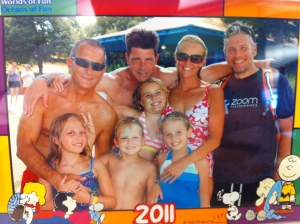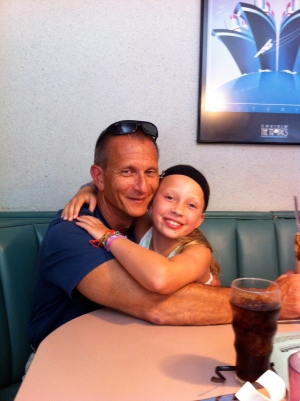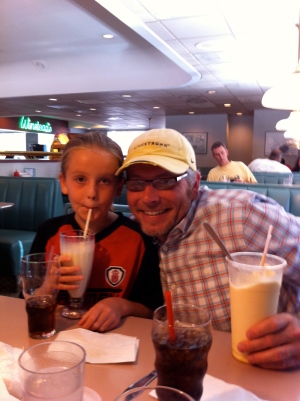
Me with My Ex-tended Family at Oceans of Fun in Kansas City, August 3, 2011. Adults from L to R: Me, my friend and my daughter
My divorce has been final for well over a year now (since 7/9/10), and it’s been more than 2 1/2 years since I first launched this blog. If there is one simple truth I’ve learned over the past 30 or so months, it is this: acceptance is a matter of the mind, surrender a matter of the heart.
I’ve actually found it relatively easy to accept certain realities as they’ve presented themselves since April of ’09. I didn’t freak when my then wife of 6 1/2 years and the mother of my kids said she didn’t know if she wanted to be married anymore. I’d been there … more than once … I got it: People fall out of love. (Reality check for all who think they’ve got a lock on their spouses: You’ve got a firmer grip on the wind, my friend.) Having been fickle in love myself, I was able, mentally, to accept my wife’s twist of fate, although the thought of our kids having to go through a divorce twisted my guts into a million tiny knots. And, when the time came, when she finally said she was going to actually file, I was able to accept fairly readily what I’d suspected all along: That there was a Him, though she continued to vehemently deny it. Thanks to Facebook, I later verified pretty easily that The Him showed up oh-so-coincidentally at about the same time as the papers. Bitter? Maybe a tinge, but it was all pretty transparent and quintessentially predictable. Few go through a divorce without that little bit of added support on the side we tell ourselves we need and so well deserve. And, on the first of July 2010, when she finally moved out, it came as no surprise that it was The Him’s house that she moved into. All of this, intellectually, I was able to accept.
What threw me for a loop, what wasn’t so easy to accept and what my heart wouldn’t surrender, was that my kids would now have a new male influence in their lives. Sadly, the fact that my Ex had a Him in her life almost came as a relief; someone else would be looking after the mother of my kids in my absence (how 1950’s of me). But the fact that they, my by then 7-year-old daughter and 4- year-old son, might be influenced by someone other than me was torturous.
The torture began, ironically, with the fact that my kids liked The Him and The Him liked my kids. Intellectually, I could accept that this was, indeed, a good thing for all concerned. But at a more gut, or should I say primal, level, I’d have rather gnaw on the veins in Him’s neck like a rabid wolf than surrender to a new normal that included someone other than me winning the hearts and minds of my children—however much or little.
Luckily, The Him turned out to be a good guy from the very beginning. In fact, within weeks of the divorce, The Him contacted me on Facebook in a boldly standup fashion and suggested we meet so he’d have the chance to become something other than “the other guy” (The Him) in my mind. This won my respect instantly and less than a month after the ink was dry on the decree, I invited The Him to my house, along with my Ex, for my son’s 5th birthday party. That day he became a guy named Jason, who had two daughters of his own, and somewhere down the line, my Ex became Meg again. Over the course of the next year, we (Meg, Jason, me, my kids, and his kids) would share a number of holidays and birthdays together in the spirit of showing our kids everything was OK, and that life could be conducted in relative normalcy even if our circumstances weren’t those of the normal majority–whoever and wherever they are.
And that spirit, the spirit of putting the kids well-being before all else ALWAYS, is what made the picture at the top of this post and, for me, the ultimate surrender possible. At some point in the past year it became painfully apparent to me that no one was likely to do greater harm to my children than me if I didn’t get over myself. Today, every time my jealousy rears its ugly head, every time I want to take a stand of some selfish sort and proclaim myself king of the parental jungle, I simply ask myself: What will harm the children less or benefit them more, me making my point or me shutting up and surrendering my self-serving emotions to a greater good? Nine out of ten times, my ego doesn’t have a leg to stand on. And I’m happy to say, nine out of ten times, I’m able to take the high road and either catch myself and shut up or correct myself and make amends as soon after I’ve said or done something stupid as humanly possible.
Consequently, one afternoon this summer, shortly before my son’s 6th birthday, Meg and Jason and I were actually able to sit down in my kitchen and plan a trip to Kansas City we all agreed would be great fun for the kids. When my friend and Grace’s godfather, Tom, discovered the trip included a Royal’s baseball game and a day at Ocean’s of Fun, he asked if he could join us. So, on the 2nd of August, Tom and Jason and I and the kids piled into a van and drove to Kansas City to watch the last place Royals get drubbed by the last place Orioles. The next day, on the 3rd of August, Meg drove down and joined us for the afternoon at Oceans of Fun and dinner that night on the Country Club Plaza.

All the kids, big and small, with Meg behind the camera: Adam, Claudia, Jason, Me, Grace, Tom, Carter.
The supreme irony: Nine years earlier, on the 3rd of August 2002, Tom had stood up with Meg and me as one of my groomsmen in our wedding, which had been followed by a brief honeymoon right there on that very Plaza in KC, and not once during our trip this summer did any of us realize that day at Oceans of Fun actually marked the anniversary (our ninth) that wasn’t—a sure sign to me a few days later that we’d all achieved an unspoken sense of closure and renewal.












